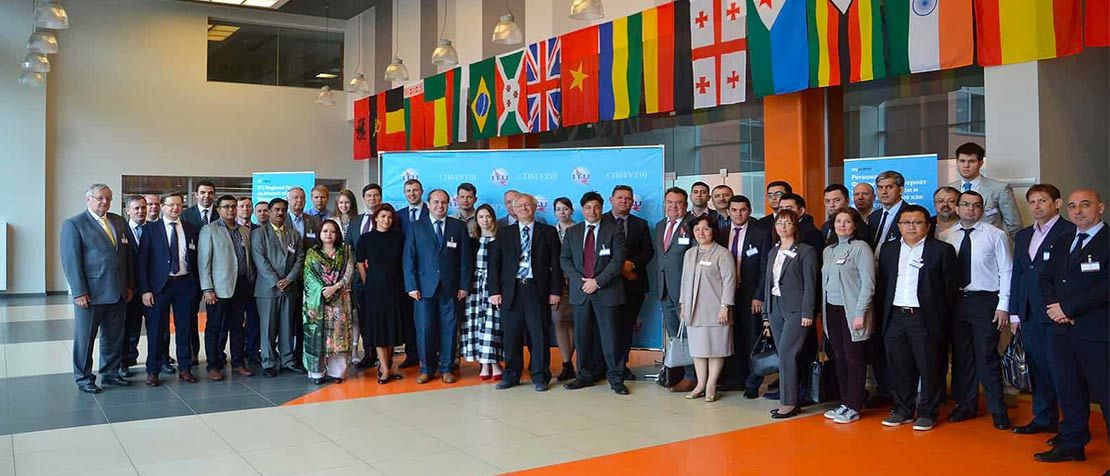
4 key takeaways from the ITU Regional Forum in Russia on 5G IoT and Big Data
Coordinated strategies for the rollout 5G and IoT systems, common principles for IoT identification, networks with ultra-low latency, network decentralization, and efficient mechanisms for data processing and management – these key requirements for the growth of the digital economy were in focus at an ITU Regional Forum last week in Saint Petersburg, Russia, 4-6 June.
Over 100 experts from 16 countries – representing government, industry and academia – met in Saint Petersburg to discuss “Internet of Things, communication networks and Big Data as the basic infrastructure of the Digital Economy”, hosted by the Bonch-Bruevich Saint Petersburg State University of Telecommunications (SPbSUT).
The event was supported by Rostelecom, which also sponsored the award of six tickets to the FIFA World Cup to the winners of a ‘lucky draw’ held during the forum.
The forum brought a regional perspective to issues under study in ITU’s standardization expert groups, in particular ITU-T Study Group 11 (Protocols and test specifications), ITU-T Study Group 13 (Future networks) and ITU-T Study Group 20 (IoT and smart cities).
The event hosted speakers representing organizations including Rostelecom, SPbSUT, MSK-IX, Tele2, FreshTel, Transtelekom, NIIR, Huawei, LTE Union, NTRA, China Telecom, D-Link, RAEN, IQMEN, ISO/IEC JTC 1/SC41, ETSI TC INT, Kaspersky Lab, Telecom Italia, UNAOC, Giprosvyaz, Tampere University of Technology, and Keysight.
4 key takeaways
Achieving the full potential of 5G, IoT and Big Data will call for a strong spirit of collaboration and coordinated strategic action inclusive of the public and private sector, emphasized forum participants.
This view is captured by ‘four key takeaways’ from the forum’s discussions:
1. The journey continues: The long road towards a cohesive IoT standards ecosystem
The long-term objective of IoT standardization is “an environment where all the things can talk to one another, where all the data can be processed in a seamless fashion – without any issue tied to the manufacturer of origin,” said François Coallier, Chair of ISO/IEC JTC 1/SC41.
To achieve this long-term objective, says Coallier, the complex ecosystem of IoT industry players will need to come together in standards efforts to agree common vocabulary, base reference architecture, and standards to support IoT platform interoperability.
2. Regional coordination of digital development strategies could offer strong support to 5G, IoT and Big Data
The forum discussed 5G systems’ significant gains in complexity over 4G systems. Participants reiterated the importance of IoT to the 5G vision. These discussions led to calls for national administrations to increase their interaction with a view to aligning their digital development strategies.
Coordinated regional action, said forum participants, would assist the region in making full use of the data generated by IoT systems.
“The integration of all of this data can be exploited to drive intelligence, which can be used again in different sectors,” said Marco Carugi, Rapporteur for ITU-T Study Group 20’s work stream on IoT use cases across vertical markets. “Globally IoT will play a big role in the digitalization of the economy.”
Participants also highlighted that the region’s success in adopting common principles for IoT identification will factor considerably into the security and reliability of the region’s ICT networks.
3. Regional coordination could accelerate VoLTE roaming
The interconnection of subscribers of LTE-based networks remains a significant challenge to operators seeking to offer their customers interoperable, high-quality VoLTE/ViLTE services (Voice and Video over LTE).
ITU-T Study Group 11 this year delivered an interconnection framework to assist industry’s offer of VoLTE/ViLTE ‘roaming’, where interactions between subscribers of different networks will be supported by high-quality packet-based voice and video communications.
The framework and associated testing methodology, ITU standards ITU Q.3640 and ITU Q.3953, provide a unified international reference for VoLTE/ViLTE interconnection – these new ITU standards encourage greater uniformity in the application of existing VoLTE/ViLTE standards at the international level.
The forum’s discussions of VoLTE interconnection alerted participants to closely related ITU work on ENUM, a system to map an ITU E.164 telephone number to a Uniform Resource Identifier (URI). ENUM could make an important contribution to the interworking of IP Multimedia Subsystem (IMS) platforms, which could in turn offer support to the deployment of VoLTE/ViLTE roaming.
4. Academic and research institutes provide lab environments crucial to 5G testing
Academic and research institutes make an essential contribution to ICT innovation as the home of basic R&D. Academia will offer laboratory environments to test 5G-era technologies. This service will continue to grow in value, said forum participants, considering the wide variety of envisioned 5G applications.
ITU-T Study Group 11 and ETSI TC INT enjoy strong collaboration in the development of test specifications. The Saint Petersburg forum highlighted new opportunity for the two bodies to collaborate in adapting testing methodologies to the 5G environment.
Giulio Maggiore, Chairman of ETSI TC INT, pointed to the establishment of a new group within ETSI TC INT focused on the network creation phase, a group with which ITU-T could collaborate in developing test specifications for 5G characteristics such as network slicing.
Learn more about the work of ITU-T Study Group 11
ITU-T Study Group 11 (Protocols and test specifications) will meet at ITU headquarters in Geneva, 18-27 July 2018.
- Executive Summaries of past meetings of ITU-T Study Group 11 can be found here…
- All approved ITU standards under the responsibility of ITU-T Study Group 11 can be found here…
- Recently approved ITU standards (2017-2020 study period) developed by ITU-T Study Group 11 can be found here…
- Draft ITU standards under development within ITU-T Study Group 20 can be found here…
